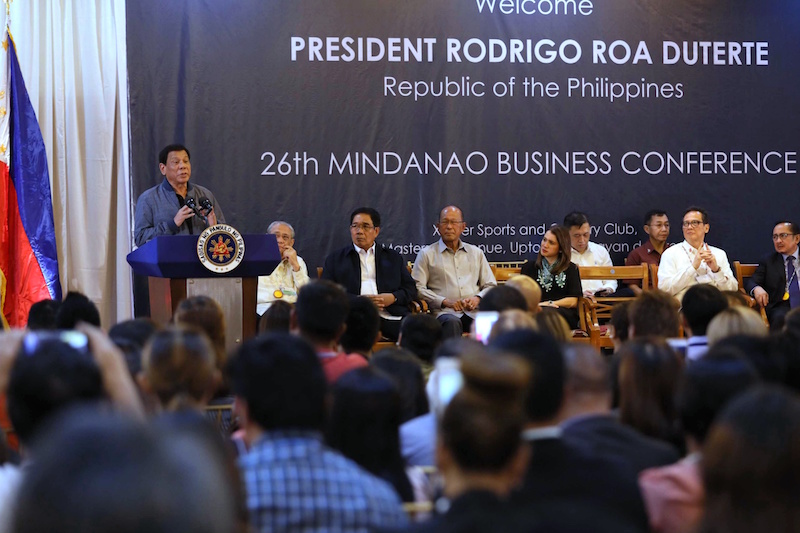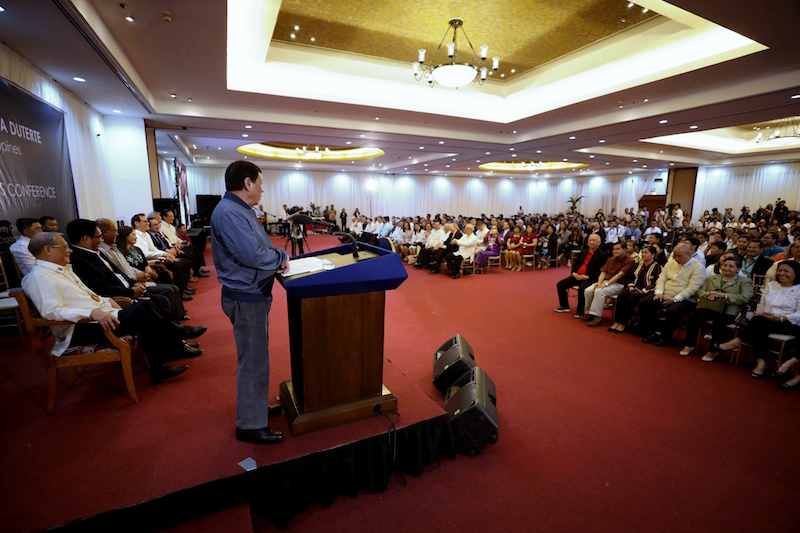As the Marawi Crisis and martial law-in-Mindanao entered Day 110 on Saturday, the country’s first Mindanawon President gave delegates to the 26th Mindanao Business Conference in Cagayan de Oro City mixed signals about Mindanao’s future under his administration.
Reading his speech at the latter part of his 37-minute talk, President Rodrigo Duterte said he was “confident” that with the business sector’s cooperation and the people’s support, “we will create a more prosperous and progressive Mindanao,” but in the earlier part of his speech which he delivered extemporaneously, he painted a grim scenario of its future: “Mindanao seems to be in trouble,” “what’s happening in Marawi seems to stretch the trouble farther than we expect,” “there will be no peace in Mindanao for the longest time,” “we are headed for a long haul of trouble,” and “the next flash point is still Mindanao.”

President Rodrigo Duterte delivers his speech at the closing ceremony of the 26th Mindanao Business Conference (MINBIZCON) at the Xavier Sports and Country Club in Cagayan de Oro City on September 9, 2017. Ace Morandante/PRESIDENTIAL PHOTO
As is typical of a Duterte extemporaneous speech, he rambled on, shifting from one topic to the other.
He said it has often been asked what ails Mindanao, why it lags behind. “Mainly because Mindanao seems to be in trouble,” he replied, and added: “I would admit that I have to correct the historical injustice asked by the Moro people but then again, what’s happening in Marawi seems to stretch the trouble farther than we expect.” He did not elaborate.
“Mindanao cannot progress,” Duterte stressed, citing the problem of law and order, the presence of the New People’s Army which he said, is into extortion, the warlords in government. He also pointed to three government agencies issuing land titles and how corruption in government has contribute to this disorder.
He said he was not trying to “agitate or scare anybody” but “the historical system of unitary type of government — which is actually fundamentally for control (of) the population because we were colonized — would not work at this time anymore.”
He reiterated that the only way historical injustice in Mindanao can be corrected is “for everybody to reconsider that position. And the elite of this country cannot hang on to this unitary type of power grab every time.”
Amending the Constitution
He did not explain how a shift to a federal form of government could address terrorism or violent extremism but warned that “if we cannot solve the problem of Mindanao vis-a-vis the different contending parties for sharing, maybe an equitable distribution of all things, we are headed for a long haul of trouble.”
“I will guarantee you that being from Mindanao, with a mother from — a Mindanawon, I will tell you now straight that there will be no peace in Mindanao for the longest time,” the President said.
Duterte has been pushing for a shift from the highly centralized Presidential, unitary system, to a federal system where power is shared by the central government and the federal states.
The shift, however, requires amending the 1987 Constitution and although he initially promised a Constitutional Convention, Duterte last year agreed to scrap the convention, citing the huge expense it would entail, and instead let Congress sit as a constituent assembly to amend the Constitution after a 25-member Consultative Committee (ConCom) submits its recommendations.
Duterte signed Executive Order10 on December 7, 2016, creating a ConCom of not more than 25 members, to “study, conduct consultations, and review the provisions of the 1987 Constitution, including but not limited to, the provisions on the structure and powers of the government, local governance, and economic policies.” The ConCom has up to six months to complete its work.
But nine months after issuing EO 10, the President has yet to name the ConCom members, pushing back the administration’s original timetable to hold the plebiscite on the amendments simultaneous with the May 2019 mid-term elections.
“Cotabato will explode”
Also on Saturday, Duterte warned the situation in Cotabato would “explode” but did not say which Cotabato he was referring to — Cotabato City? North Cotabato South Cotabato? — and did not also provide details into why it would “explode.”
‘Yang Cotabato na ‘yan, puputok ‘yan, kaya isang… isang lote, tatlo ang titulo (That Cotabato, it will explode … one lot, three titles). And somebody has to explain that. Otherwise, pupu… tignan mo, ano ang sunod na…. the next flash point is still in Mindanao,” Duterte said.
Duterte’s pronouncement caused distress among residents of the Cotabatos.
On September 1, Duterte said at the Eastern Mindanao Command’s 11th anniversary celebration that he was already considering lifting martial law earlier “but the way it looks, parang may spillover na sa ARMM eh. Sa Buldon,” refering to Buldon in Maguindanao.
Duterte’s pronouncement surprised local officials and the military who said no such “spillover” was monitored.
“Prosperous and progressive Mindanao”
Shifting from extemporaneous delivery to reading his prepared speech, Duterte noted that with the right infrastructure and sound business environment, Mindanao’s great potential can be realized, hence government is “aggressively pursuing infrastructure projects in Mindanao” to facilitate transfer of goods and services and boost mobility and connectivity.
He cited the Mindanao Railway system, the Panguil Bay Bridge and the Laguindingan Airport development projects which are “in various stages of implementation.” He said government is actively providing assistance in the production of “high value crops,” that the Color-Coded Agri-Fishery Map is now available to farmers to help them identify the most suitable crops to plant their areas.

President Rodrigo Roa Duterte, in his speech during the closing ceremony of the 26th Mindanao Business Conference (MINBIZCON) at the Xavier Sports and Country Club in Cagayan de Oro City on September 9, 2017, reiterates he will stop corruption and restore peace and order in Mindanao so that the island can become more conducive for businesses to thrive. Simeon Celi, Jr. /PRESIDENTIAL PHOTO
But Duterte admitted that efforts to promote business, trade and investment in Mindanao “will be in vain if we cannot ensure stability and order, as well as secure just and lasting peace in the island.”
He said government is intensifying the fight against illegal drugs, crime and corruption to create a more enabling and nurturing business environment in Mindanao.
He assured the business sector that government remains “firmly committed to wiping out local terrorists and other threat groups that continue to hinder our peace and development efforts, especially the ISIS-inspired ones who have attempted to take over the City of Marawi.”
“Government will do everything to make sure that Marawi City recovers and that it will rise again as a thriving and flourishing city,” he said.
He said the “grand plans for Mindanao” will not succeed without the help and participation of the private sector. He assured them of government’s help and “with your cooperation and our people’s support, I am confident that we will create a more prosperous and progressive Mindanao.”
Peace process
Duterte also assured the Moro Islamic Liberation Front (MILF) that he continues to “respect the leadership and we would like to pursue the talks” and gave the same assurance to his friend Nur Misuari, founding chair of the Moro National Liberarion Front (MNLF).
The MNLF and MILF, however, are no longer on the “peace talks” level but on implementation. Peace agreements had been signed with government in the last four decades: 1976 Tripoli Agreement and 1996 Final Peace Agreement with the MNLF and the 2012 Framework Agreement on the Bangsamoro and the 2014 Comprehensive Agreement on the Bangsamoro with the MILF.
MNLF Peace Implementing Panel chair Randolph Parcasio on July 19 said they will no longer submit their proposed amendatory law to enhance the Autonomous Region in Muslim MIndanao (ARMM) but will instead push for federalism. Paracasio has been told by the President that he would be part of the 25-member ConCom.
The GPH-MILF’s peace agreement provides for the passage of a Bangsamoro Basic Law to pave the way for the creation of the Bangsamoro, a new autonomous political entity that would replace the ARMM. During his Presidential campaign, Duterte said he would make the BBL a “template for federalism.”
The Bangsamoro Transition Commission which drafted the BBL submitted it to the President on July 17 but it took a month for the Office of the President to transmit it to the Senate and the House of Representatives.
As of September 9, the draft BBL has yet to be filed as bill as it still awaits authors.
The Legislative-Executive Development Advisory Council on August 29 released a list of 28 priority bills of the Duterte administration, the proposed BBL not among them although Senate President Aquilino Pimentel III and Presidential spokesperson Ernie Abella said it would be included in the next LEDAC meeting.
A five-member MILF delegation met with the President in Malacanang on September 5.
BTC chair Ghazali Jaafar said the President called for a meeting on September 14 also in Malacanang, with the BTC, leaders of Congress, the government’s peace implementing panel and Cabinet officials involved in peace and security issues.
In no other time in Philippine history has there been a situation where the Philippine President is a Mindanawon, and the Senate President, House Speaker, Presidential Adviser on the Peace Process, secretaries of Defense, Finance, Health, Labor, Agriculture, among others, are also all Mindanawons. Duterte also named three Maranaos to top posts.
Peace pacts and violent extremism
But while Duterte points to “local terrorists and other threat groups” as hindering peace and development efforts, MILF and MNLF leaders had already warned in a forum on federalism on November 30 last year that a continued failure in implementing the peace agreements will be the rallying point of violent extremists,
“We, the MNLF and MILF .. we will become irrelevant if our peace agreements will not be implemented and in fact that is the issue, the rallying point of the extremists in Mindanao. They’re saying, ‘look at the MNLF and the MILF, their agreements have never been implemented. So there’s no point talking with this government who has violated peace agreements since time immemorial,’” Parcasio said.
Mohagher Iqbal, chair of the peace implementing panel of the MILF, said “until and unless the historic injustices committed against the Moro people (are addressed), I think … the violent extremist groups would still multiply because they have so much reason to fight the government.”
http://www.mindanews.com/peace-process/2017/09/duterte-to-biz-sector-there-will-be-no-peace-in-mindanao-for-the-longest-time/

No comments:
Post a Comment
Note: Only a member of this blog may post a comment.